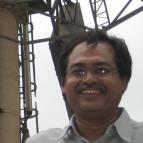Shireesh B Kedare
Shireesh B Kedare
Professor and Director (IIT Bombay)
director(at)iitb(dot)ac(dot)in; Web : www(dot)iitb(dot)ac(dot)in
Academic Background:
- B. Tech. (Mech.Engg.), IIT Bombay, 1985
- Ph.D., IIT Bombay, 1992
Contact Address:
Nandan Nilekani Main Building, IIT Bombay, Adi Shankaracharya Marg, Powai, Mumbai 400076, INDIA
Ph (Office): +91 22 2572 3488
Ph (Office): +91 22 2576 7001
Research Interest:
- Concentrating and other solar technologies with thermal energy storage
- Renewable energy technologies for decarbonization of Indian process industries
- Understanding energy transition pathways through systems approach
- System integrated context specific participative development
Courses Offered:
- EN 601:Nonconventional Energy Sources (Core course for M.Tech students)
- EN 619:Solar Energy for Industrial Process Heat (PG elective course)
- EN 615:Wind Energy Conversion Systems (UG-PG-multi department elective course)
- TD 605:Appropriate Technology (Core course for M.Tech students)
- EN 211:Mechanics of materials (Previously EN 307:Equipment Design and Controls)
- EN 110:Fundamentals of Energy Engineering; also as EN 101:Introduction to Energy & EN 102:Energy Engineering Fundamentals (UG introductory course)
- EN 408:Energy Design Project
- EN 609:Energy Laboratory
- EN 612:Solar Energy Laboratory
- EN 310:IC Engine and Combustion Lab
List of Publications:
- Papers in journals: international (57); national (10)
- Papers in conferences / proceedings: international (44); national (7)
- Books / Booklets / Chapters / Articles in books / Standards (9), in Magazines (7); Reports (9)
- Patents: Granted (6) and Applied for (1); Awards (12 + 1 nomination)
- Standards Developed (2)
- Scopus: Listed: 60; h-index: 23; i-index: 39; Total Citations: 2388; 2019 to 2023: 1178; In the year 2023: 209
- Google Scholar: Listed:108; h-index: 28; i-index: 47; Total Citations: 3732; 2019 to 2023: 1648; In the year 2023: 274
Work Experience:
- Professor-in-charge, Centre of Excellence in Oil, Gas and Energy, IIT Bombay (Since Nov 2019)
- Member BoG, IIT Madras (Since July 2018)
- Nominated Member, Council of IITs, Ministry of Education (Since March 2023)
- Member, Research Advisory Council (RAC) of NTPC Energy Technology Research Alliance (NETRA), NTPC Ltd. India (November 01, 2023 to October 31, 2025)
- Expert Member (S&T) on Khadi Village and Industries Commission (KVIC) (Jan 2021 to Sept 2022 and now since Nov 2022)
- Nominee on the Advisory Board for SNDT University, Mumbai (from March, 2023)
- Nominee on the Board of Management for Gandhigram Rural Institute Society, Dindigul (since Sept 30, 2022)
- Visitor’s Nominee on the selection committee for the post of Professor for the group of Mechanical Engineering as well as Energy Science and Engineering, for all IITs (17th September, 2024 till date)
- Visitor's nominee for NIT's from 2017 to 2020 and at different IIT's since 2022 to 2024
- Independent Director, ONGC Ltd. (Nov 2015-Nov 2019)
- Member, Solar Thermal Energy Sub-committee: MED 04:1, Bureau of Indian Standards, Government of India, New Delhi (from April 2008 to May 2024)
- Adjunct Faculty in Dept of Energy Sc and Engg (July 2001-May 2013)
- Director (R and D), Clique Developments Ltd., Mumbai (July 2001-May 2013)
- Sponsored R and D Projects completed (27 + 2 through Clique Developments Ltd.); Consultancy (1);
- Regular UG and PG courses conducted at IIT Bombay (57)
- Lab (1) and test set-ups (5) developed
- Open courses and workshops conducted (10)
Invited Lecture:
- Invited Lectures (105)
Current Students:
- Ph.D. Thesis: Completed (13), ongoing (4); PDF (1)
- Dissertations Guided: M.Tech. (59); Dual Degree (27); M.Sc. (3); M.Phil. (1); M.S. (4)
Additional Information:
Strong capacity for relevant research, indigenous development and commercialization of technologies through industry collaborations; with wide exposure to process industries. Ability to effectively communicate different aspects of engineering and technology, arouse students’ interest and exposing and encouraging students for realistic multidimensional approach. Capable of reaching out and understanding ground issues; with wide organizational experience. Strong in establishing organizational systems and processes for engagement of faculty, experts and practitioners from industry for taking research to field. A person with vision for transition to sustainable future with links to technology research relevant to industry, organizational and policy reforms as well as societal participation. Prof. Kedare has been taking efforts to minimize daily carbon foot print. He practices implementation of various energy saving measures, recycling bio-waste at home and walking to work or using public transport. His credit of carbon saving includes emissions mitigated by ‘Arun’ solar concentrators and his efforts of encouraging large number of small and marginal farmers to use organic methods of cultivation in place of using inorganic fertilizers and pesticides through participatory methods.


